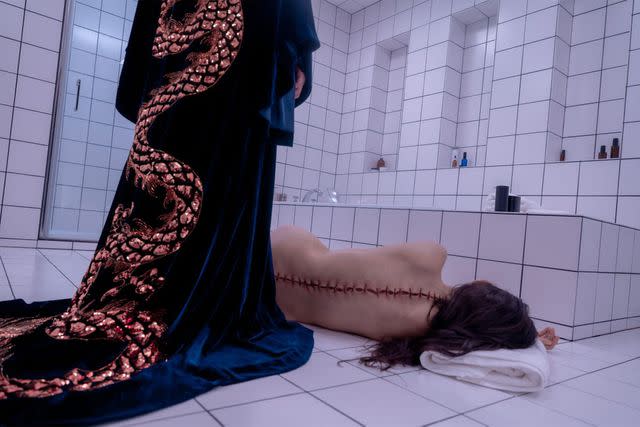Demi Moore, Margaret Qualley recall 'brutal,' bloody shoot for grotesque horror film “The Substance: ”'Can't f---ing move'

From daunting high-energy choreography to nine-hour prosthetic application, the stars tell EW "The Substance" was a satisfyingly grueling, months-long shoot.
Sitting for almost 10 hours of grotesque prosthetic work to transform her face and body for The Substance was simply the beginning of each day for Demi Moore on the set of director Coralie Fargeat's body-horror tale.
"It was always an hour and a half to get off. Two hours, roughly," Moore tells Entertainment Weekly, now two years out from its nearly sixth-month 2022 shoot in Paris. The effects of filming, however, clearly still linger as she and co-lead Margaret Qualley nestle together (with Moore's chihuahua, Pilaf, delicately napping under Qualley's arm) on a couch at a Toronto hotel. "It's glued," she continues, referencing 14 pieces that rested on her face alone. "You have to be as careful if not more careful taking it off so you don’t destroy your skin."
Comfy as they may be lapping up the film's critical praise, making the movie was a painstaking process that mirrors Fargeat's approach to the project, which the filmmaker describes as a "direct, brutal, violent" meditation on self-hatred and societal commodification of women's bodies. It's told via the story of Moore's Elisabeth Sparkle, an aging, Oscar-winning Hollywood vet whose last hurrah as a fitness video instructor screeches to a halt when the network pursues a younger star. The anxiety of being discarded by an industry that once embraced her forces Elisabeth to experiment with a black-market drug that, uh, births (in gut-churning fashion) a revitalized version of herself. Like something out of Alien, Sue, played by Qualley, bursts from Elisabeth's spine, propelling the film toward a spectacularly sloshy, splatter-filled climax of disturbing, nightmarish imagery grounded in mostly practical effects.

MUBI
Margaret Qualley and Demi Moore in 'The Substance'As much as it is a visual spectacle, The Substance also speaks to Fargeat's experience as a woman who, now seven years after her breakout success with the rape-retribution thriller Revenge in 2017, wanted to take her time, paying dutiful respect to her creative process and her own decaying ideas of self-worth as a woman in her 40s. “All of this hits me in a very violent way more than ever,” Fargeat explains of the film's gore, an abundant reminder that the most savage wounds are those buried deep within us. “The way I think it has weighed on my life in a very violent way for many years."
Moore's and Qualley's commitment was well worth the investment, too. With the film earning standout praise at both Cannes and the Toronto International Film Festival, Moore, for the first time in her 40-plus-year career, could become a serious Oscar contender throughout the awards season ahead. That path, the actresses explain, is no less exciting — despite being forged in real exhaustion and fake blood.
"All of it. Every goddamned day. Even the dancing [in the workout video portions] was brutal," Qualley says when asked if anything pushed her to the brink, physically and emotionally.
Sign up for Entertainment Weekly's free daily newsletter to get breaking TV news, exclusive first looks, recaps, reviews, interviews with your favorite stars, and more.
Moore, who told EW earlier this year that she considered quitting acting until this film restored her own sense of worth in an industry she felt ostracized from, adds: "We’d hit the weekends and, both of us, did we go out anywhere? We didn’t do anything. On rest time, we’d text, I’d go to her apartment. It was two floors down, and we’d be like, ‘I can’t f---ing move.’ It was difficult."
The pressure proved to be too much for some. Fargeat confirms that Universal was once on board to distribute but quickly bowed out after seeing a cut of the film, speculating that the studio didn't feel it was the right fit to push the film out to the masses. (A representative at Universal did not respond to EW's request for comment.)

Courtesy Cannes Film Festival
'The Substance'Fargeat also says that, like Elisabeth's grappling with a vicious TV executive (played by Dennis Quaid), there were voices along the way that attempted to curb her vision for her own career evolution with The Substance, in theaters nationwide on Friday.
“Oh, yes” she says without hesitation, in response to a question about creative forces who pressured her to turn to cheaper digital effects for the film's gorier scenes. Yet, Fargeat persisted. "I knew I couldn’t do it differently because the movie is about flesh, blood, and bones. It’s about filming what you feel, and what society does to you. I needed to show it for real," she stresses. "It’s the symbolic: Look at the violence. Don’t shy away. The violence is here."
Read the original article on Entertainment Weekly.

 Yahoo Lifestyle
Yahoo Lifestyle 
